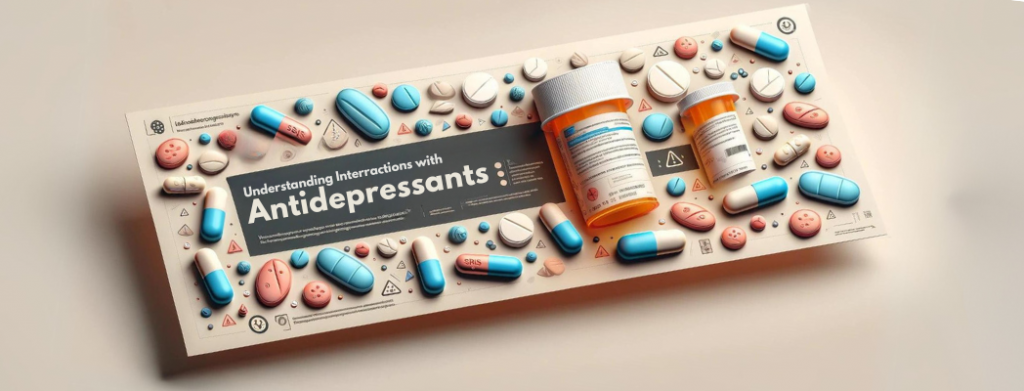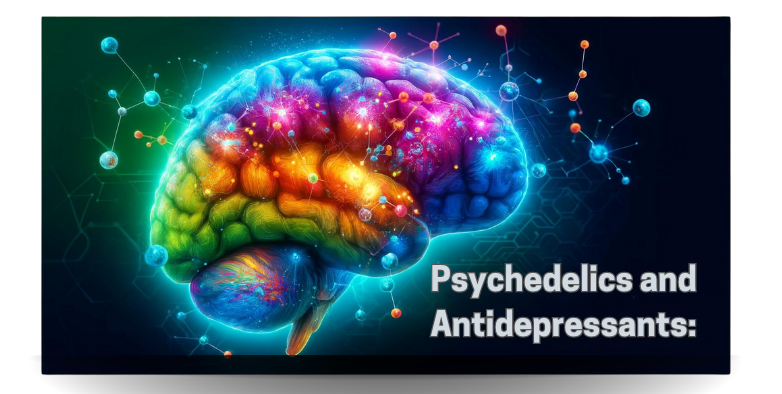What You Need to Know:
For those contemplating the integration of psychedelic mushrooms into their mental wellness regime, it’s crucial to understand the interactions between psilocybin—the active component in psychedelic mushrooms—and existing antidepressant medications.
Psilocybin has garnered attention for its potential in treating depression and other mental health issues. However, it’s important to recognize that certain antidepressants may interact negatively with psilocybin. Before considering psilocybin for therapeutic purposes, always consult with your healthcare provider to assess any potential risks specific to your medication regimen.
Understanding Psilocybin:
Discovered in 1958, psilocybin is the psychoactive substance found in various types of mushrooms, often referred to as “magic mushrooms” or “psychedelic truffles.” When ingested, psilocybin is converted into psilocin in the stomach, which then affects the brain by activating serotonin receptors. This activation can lead to profound changes in perception, a sense of connectedness, and occasionally, mystical experiences. Psilocybin’s interaction with the brain’s serotonergic system is also why it shows promise for long-lasting relief from severe depression.
Interactions with SSRIs:
Selective Serotonin Reuptake Inhibitors (SSRIs), a common class of antidepressants including drugs like Citalopram and Sertraline, increase serotonin levels in the brain. Mixing SSRIs with psilocybin can dampen the psychedelic effects due to the saturation of serotonin receptors. Although rare, there is also a risk of serotonin syndrome, a potentially serious condition resulting from too much serotonin in the brain.
Some of the most well-known SSRIs include:1
- Citalopram (Celexa, Cipramil)
- Escitalopram (Lexapro, Cipralex)
- Fluoxetine (Prozac, Sarafem)
- Fluvoxamine (Luvox, Faverin)
- Paroxetine (Paxil, Seroxat)
- Sertraline (Zoloft, Lustral)
Considering SNRIs and Other Antidepressants:
Serotonin-Norepinephrine Reuptake Inhibitors (SNRIs) and other antidepressant classes such as MAOIs and TCAs also interact with the serotonergic system, which can complicate the effects when combined with psilocybin. For those on such medications, the impact of psilocybin may be reduced, or in some cases, adverse effects could arise.
Can You Take Shrooms On A TCA/TeCA?
Tricyclic Antidepressants (TCAs) and Tetracyclic Antidepressants (TeCAs) are medications that are less commonly seen in Western medicine due to the preference for so-called “third generation” antidepressants (SSRIs, SNRIs).
Some of the most well-known TCAs and TeCAs are:
- Amineptine (Survector, Maneon)
- Amitriptyline (Elavil, Endep)
- Amitriptylinoxide (Amioxid, Ambivalon, Equilibrin)
- Amoxapine (Asendin)
- Clomipramine (Anafranil)
- Desipramine (Norpramin, Pertofrane)
- Dibenzepin (Noveril, Victoril)
- Dimetacrine (Istonil)
- Dosulepin (Prothiaden)
- Doxepin (Adapin, Sinequan)
- Imipramine (Tofranil)
- Lofepramine (Lomont, Gamanil)
- Maprotiline (Ludiomil)
- Melitracen (Dixeran, Melixeran, Trausabun)
- Mianserin (Tolvon)
- Mirtazapine (Remeron)
- Nitroxazepine (Sintamil)
- Nortriptyline (Pamelor, Aventyl)
- Noxiptiline (Agedal, Elronon, Nogedal)
- Opipramol (Insidon)
- Pipofezine (Azafen/Azaphen)
- Protriptyline (Vivactil)
- Setiptiline (Tecipul)
- Tianeptine (Stablon, Coaxil)
- Trimipramine (Surmontil)
TCAs and TeCAs work in a similar way to SNRIs, by boosting the levels of serotonin and norepinephrine in the brain. However they also activate a wide range of additional receptors, and also block some ion channels, contributing to their dangerously diverse range of side-effects.
Since TCAs and TeCAs have a less sophisticated effect on physiology and have been known to cause deaths by their effects on the heart, it is not recommended to mix these with psilocybin. In doubt, please contact your mental health care provider. The psychedelic experience is intense, and it is not wise to combine any substance that affects your heart or physiology with psilocybin.
Lithium is often given as a mediator in combination with TCAs. Numerous reports suggest that Lithium, when mixed with psychedelics, can cause fatal seizures or heart attacks. Do not mix psilocybin and Lithium.
Can You Take Shrooms On An NRI/NDRI?
Norepinephrine Reuptake Inhibitors (NRIs) and Norepinephrine-Dopamine Reuptake Inhibitors (NDRIs) are substances used in the treatment of depression and anxiety disorders. They work by increasing the amount of norepinephrine (or norepinephrine and dopamine, in the case of NDRIs) available in the brain.
NRIs have mixed evidence of effectiveness, and it’s possible that some are less effective than placebo.
Some classic NRIs and NDRIs include:
- Atomoxetine (Strattera)
- Bupropion (Wellbutrin)
- Methylphenidate (Ritalin, Concerta)
- Reboxetine (Edronax)
- Teniloxazine (Lucelan, Metatone)
- Viloxazine (Vivalan)

Tapering off:
Guidance for Those on Antidepressants:
If you are considering tapering off antidepressants for psychedelic therapy, it is critical to do so under the guidance of a healthcare professional. Each individual’s situation should be evaluated on a case-by-case basis to tailor safe and effective treatment plans.
Final Thoughts:
While the therapeutic potential of psilocybin is promising, the decision to incorporate it into treatment should be made with careful consideration of current medications and overall mental health strategy. Always consult with a medical professional to navigate these decisions safely.
For those interested in exploring new ways to manage depression and willing to consider psychedelic therapy, understanding the interplay between psilocybin and antidepressants is a crucial first step. Remember, safety and informed choices are paramount in the journey towards mental wellness.

